人教版九年级全册Unit 1 How can we become good learners 过关训练(无答案)
文档属性
| 名称 | 人教版九年级全册Unit 1 How can we become good learners 过关训练(无答案) | 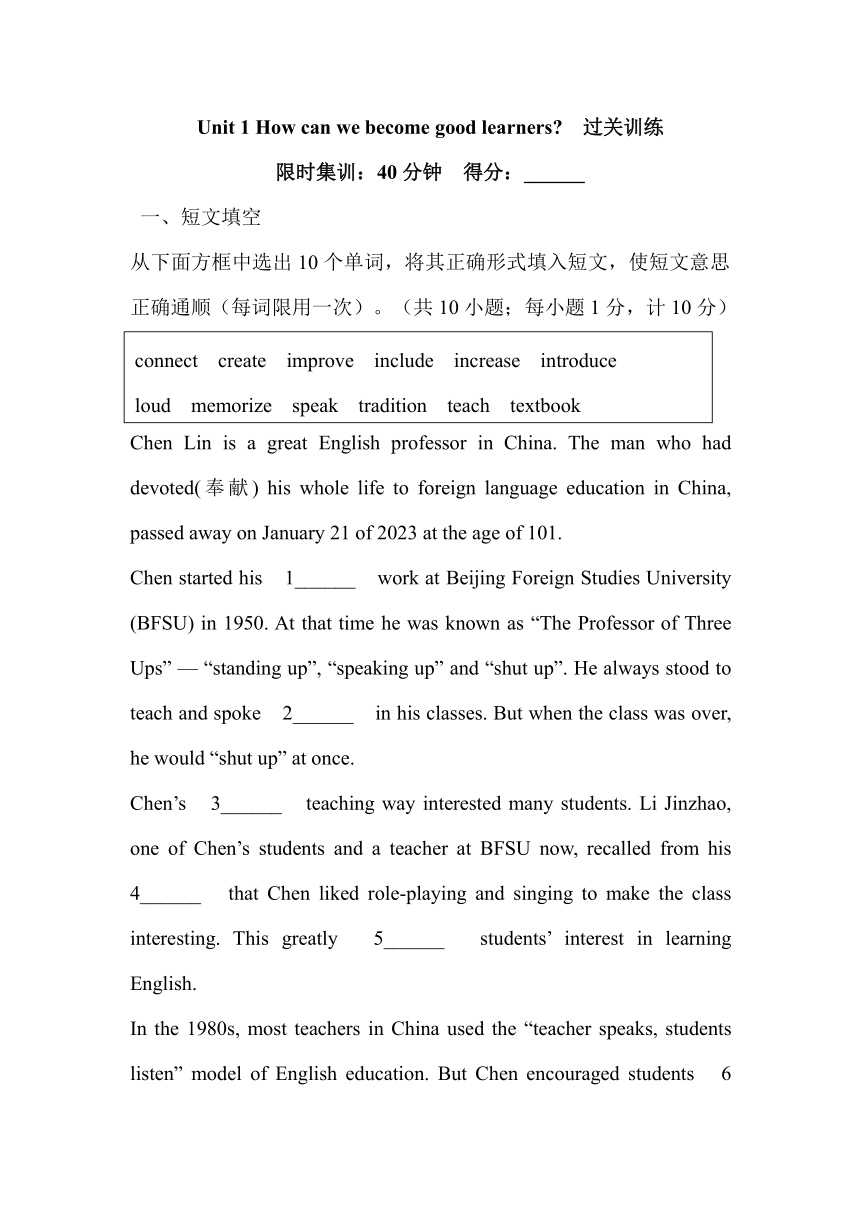 | |
| 格式 | docx | ||
| 文件大小 | 21.9KB | ||
| 资源类型 | 教案 | ||
| 版本资源 | 人教新目标(Go for it)版 | ||
| 科目 | 英语 | ||
| 更新时间 | 2025-08-07 16:06:32 | ||
图片预览

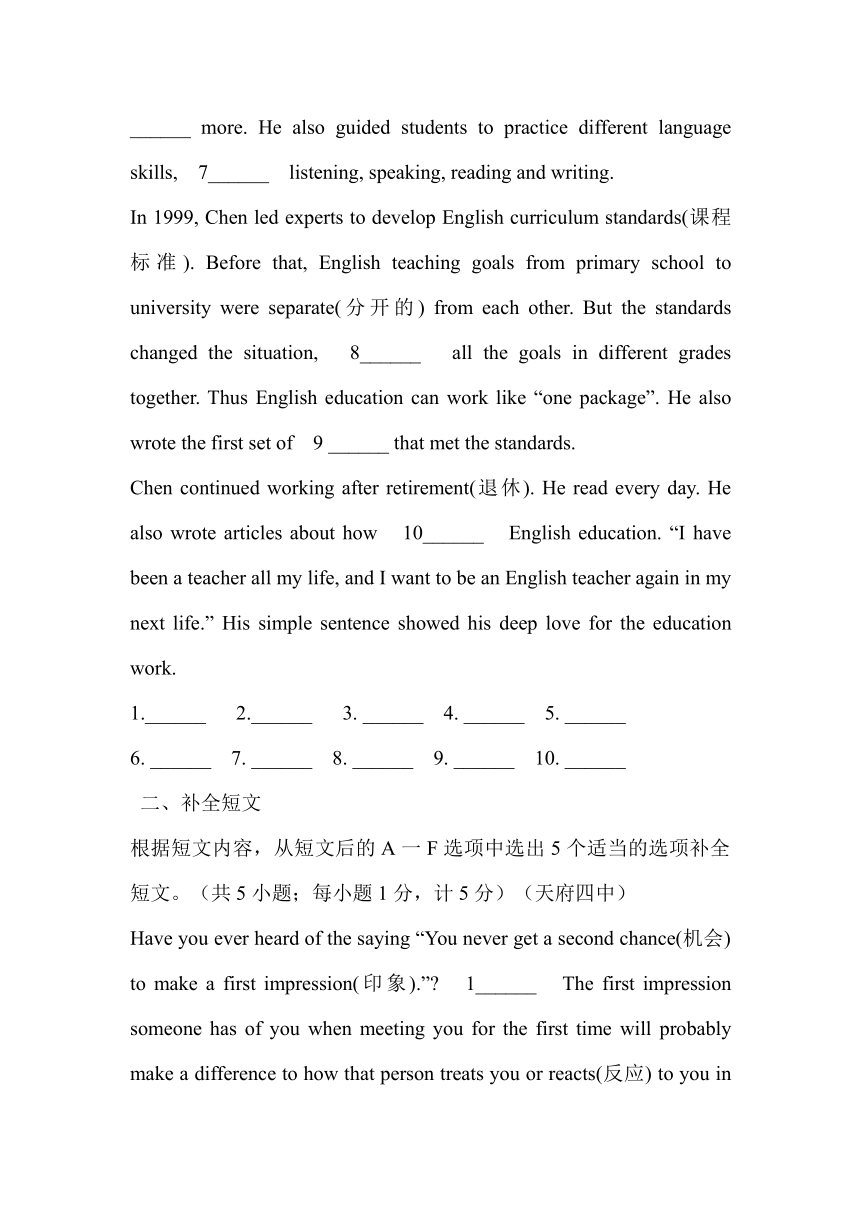
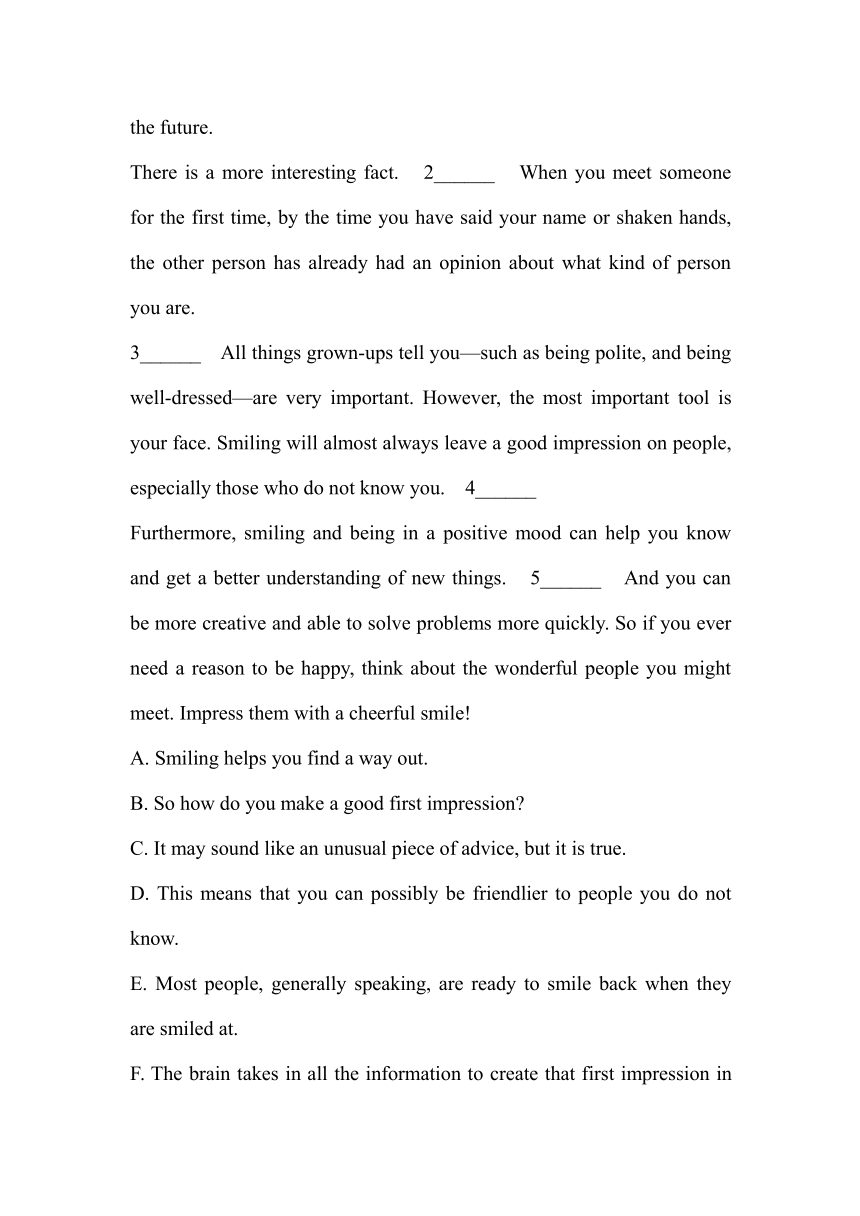
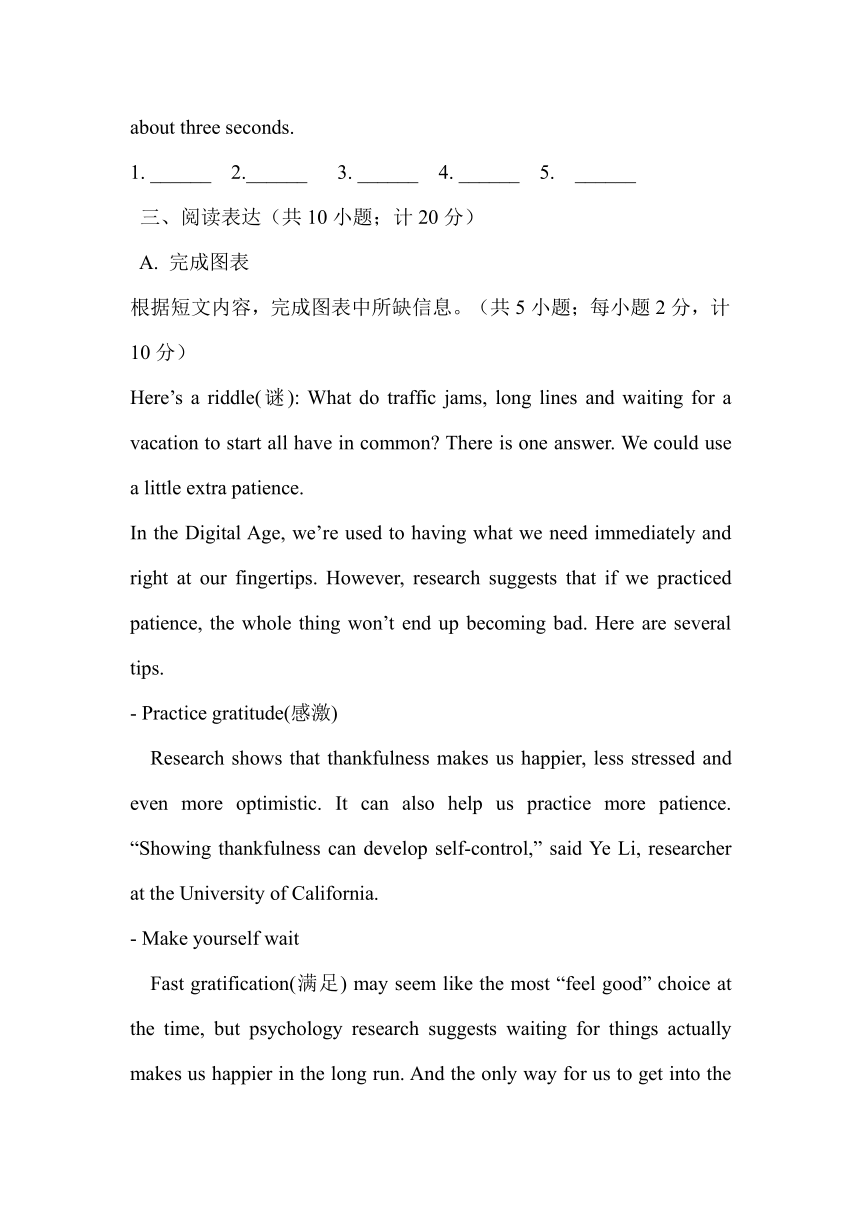
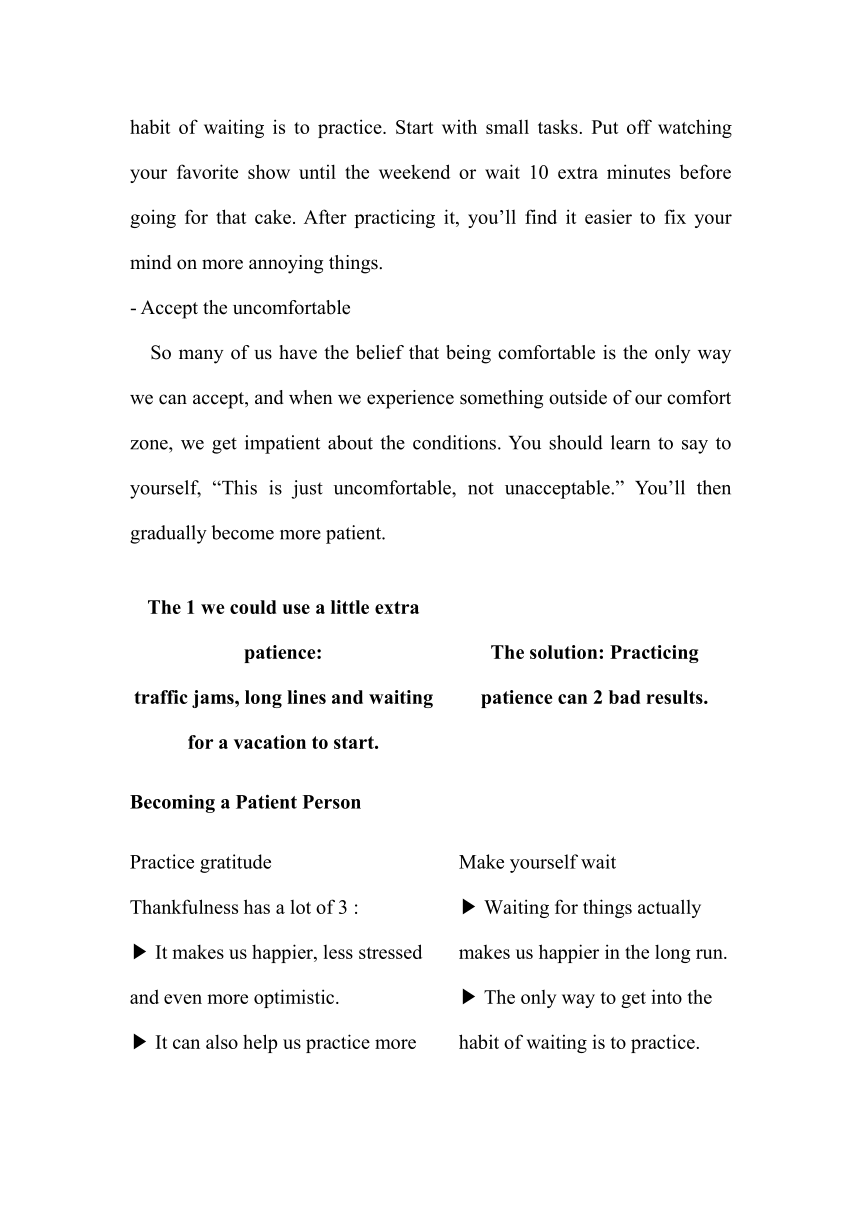
文档简介
Unit 1 How can we become good learners 过关训练
限时集训:40分钟 得分:______
一、短文填空
从下面方框中选出10个单词,将其正确形式填入短文,使短文意思正确通顺(每词限用一次)。(共10小题;每小题1分,计10分)
Chen Lin is a great English professor in China. The man who had devoted(奉献) his whole life to foreign language education in China, passed away on January 21 of 2023 at the age of 101.
Chen started his 1______ work at Beijing Foreign Studies University (BFSU) in 1950. At that time he was known as “The Professor of Three Ups” — “standing up”, “speaking up” and “shut up”. He always stood to teach and spoke 2______ in his classes. But when the class was over, he would “shut up” at once.
Chen’s 3______ teaching way interested many students. Li Jinzhao, one of Chen’s students and a teacher at BFSU now, recalled from his 4______ that Chen liked role-playing and singing to make the class interesting. This greatly 5______ students’ interest in learning English.
In the 1980s, most teachers in China used the “teacher speaks, students listen” model of English education. But Chen encouraged students 6 ______ more. He also guided students to practice different language skills, 7______ listening, speaking, reading and writing.
In 1999, Chen led experts to develop English curriculum standards(课程标准). Before that, English teaching goals from primary school to university were separate(分开的) from each other. But the standards changed the situation, 8______ all the goals in different grades together. Thus English education can work like “one package”. He also wrote the first set of 9 ______ that met the standards.
Chen continued working after retirement(退休). He read every day. He also wrote articles about how 10______ English education. “I have been a teacher all my life, and I want to be an English teacher again in my next life.” His simple sentence showed his deep love for the education work.
1.______ 2.______ 3. ______ 4. ______ 5. ______
6. ______ 7. ______ 8. ______ 9. ______ 10. ______
二、补全短文
根据短文内容,从短文后的A一F选项中选出5个适当的选项补全短文。(共5小题;每小题1分,计5分)(天府四中)
Have you ever heard of the saying “You never get a second chance(机会) to make a first impression(印象).” 1______ The first impression someone has of you when meeting you for the first time will probably make a difference to how that person treats you or reacts(反应) to you in the future.
There is a more interesting fact. 2______ When you meet someone for the first time, by the time you have said your name or shaken hands, the other person has already had an opinion about what kind of person you are.
3______ All things grown-ups tell you—such as being polite, and being well-dressed—are very important. However, the most important tool is your face. Smiling will almost always leave a good impression on people, especially those who do not know you. 4______
Furthermore, smiling and being in a positive mood can help you know and get a better understanding of new things. 5______ And you can be more creative and able to solve problems more quickly. So if you ever need a reason to be happy, think about the wonderful people you might meet. Impress them with a cheerful smile!
A. Smiling helps you find a way out.
B. So how do you make a good first impression
C. It may sound like an unusual piece of advice, but it is true.
D. This means that you can possibly be friendlier to people you do not know.
E. Most people, generally speaking, are ready to smile back when they are smiled at.
F. The brain takes in all the information to create that first impression in about three seconds.
1. ______ 2.______ 3. ______ 4. ______ 5. ______
三、阅读表达(共10小题;计20分)
A. 完成图表
根据短文内容,完成图表中所缺信息。(共5小题;每小题2分,计10分)
Here’s a riddle(谜): What do traffic jams, long lines and waiting for a vacation to start all have in common There is one answer. We could use a little extra patience.
In the Digital Age, we’re used to having what we need immediately and right at our fingertips. However, research suggests that if we practiced patience, the whole thing won’t end up becoming bad. Here are several tips.
- Practice gratitude(感激)
Research shows that thankfulness makes us happier, less stressed and even more optimistic. It can also help us practice more patience. “Showing thankfulness can develop self-control,” said Ye Li, researcher at the University of California.
- Make yourself wait
Fast gratification(满足) may seem like the most “feel good” choice at the time, but psychology research suggests waiting for things actually makes us happier in the long run. And the only way for us to get into the habit of waiting is to practice. Start with small tasks. Put off watching your favorite show until the weekend or wait 10 extra minutes before going for that cake. After practicing it, you’ll find it easier to fix your mind on more annoying things.
- Accept the uncomfortable
So many of us have the belief that being comfortable is the only way we can accept, and when we experience something outside of our comfort zone, we get impatient about the conditions. You should learn to say to yourself, “This is just uncomfortable, not unacceptable.” You’ll then gradually become more patient.
The 1 we could use a little extra patience:
traffic jams, long lines and waiting for a vacation to start. The solution: Practicing patience can 2 bad results.
Becoming a Patient Person
Practice gratitude
Thankfulness has a lot of 3 :
It makes us happier, less stressed and even more optimistic.
It can also help us practice more patience. Make yourself wait
Waiting for things actually makes us happier in the long run.
The only way to get into the habit of waiting is to practice. The more you practice waiting, the more 4 can be paid to more annoying things.
Accept the uncomfortable
Many of us 5 accepting something outside of our comfort zone. We should learn to say to ourselves, “This is just uncomfortable, not unacceptable.”
1. _________________________
2. _________________________
3. _________________________
4. _________________________
5. _________________________
B. 任务型阅读
根据短文内容,按要求回答问题。(共5小题;每小题2分,计10分)(新编)
Joel Sartore is a writer, teacher, and photographer. His words and beautiful photos show his love of photography and of the natural world.
Question 1: __________
My first job was for a newspaper. After a few years there, I met a National Geographic photographer. He liked my photos and said I should send some to the magazine. So I did. That led to a one-day job. And that led to a nine-day job, and so on.
Question 2: What kind of photographer is National Geographic looking for
To get into National Geographic, you have to give them something they don’t have. It’s not enough just to be a great photographer. You also have to be a scientist, for example, or be able to dive under sea ice, or spend maybe several days in a tree.
Question 3: Is it hard to get a job as a photographer today
It’s now harder to work for magazines. Technology makes it easy to take good pictures, which means there are more photos and photographers. Also, the Web is filled with photos from all around the world that are free, or cost very little. These photos are often good enough to be put in books and magazines. What the magazines need to do these days is to pay for these photos.
Question 4: I want to be a photographer. Do you have any advice for me
Advice Well, work hard. Be passionate(热情的)about every project you work on. Take lots of pictures in different situations. Look at others’ photos carefully and learn from them. And be curious about everything. There’s something to photograph everywhere.
6. What kind of passage is it (2 words)
It is a(n) ______________.
7. What can Question 1 be (no more than 8 words)
_____________________________________________________________________
8. How many reasons did Joel Sartore mention in his answer to Question 3 (1 word)
_____________________________________________________________________
9. What’s your understanding of the underlined sentence in the last paragraph (no more than 5 words)
_____________________________________________________________________
10. Who is most likely to be given a job by National Geographic (no more than 6 words)
A photographer who _________________________.
四、书面表达(计15分)(树德实验)
假设你是李华,你的好友小明想学好英语,但在学习过程中存在一些困难。请你给小明回一封邮件,根据下面表格的信息针对他的英语学习问题提出建议,并谈谈你对这些学习方法的感受。
要求:100 120词。可适当发挥。
问题 建议
1. 对英语学习兴趣不大 1. 明白英语学习的重要性。
2. ……
2. 记不住单词 ……
3. 听力很差 ……
4. …… ……
_____________________________________________________________________
_____________________________________________________________________
_____________________________________________________________________
_____________________________________________________________________
_____________________________________________________________________
_____________________________________________________________________
_____________________________________________________________________
_____________________________________________________________________
_____________________________________________________________________
_____________________________________________________________________
限时集训:40分钟 得分:______
一、短文填空
从下面方框中选出10个单词,将其正确形式填入短文,使短文意思正确通顺(每词限用一次)。(共10小题;每小题1分,计10分)
Chen Lin is a great English professor in China. The man who had devoted(奉献) his whole life to foreign language education in China, passed away on January 21 of 2023 at the age of 101.
Chen started his 1______ work at Beijing Foreign Studies University (BFSU) in 1950. At that time he was known as “The Professor of Three Ups” — “standing up”, “speaking up” and “shut up”. He always stood to teach and spoke 2______ in his classes. But when the class was over, he would “shut up” at once.
Chen’s 3______ teaching way interested many students. Li Jinzhao, one of Chen’s students and a teacher at BFSU now, recalled from his 4______ that Chen liked role-playing and singing to make the class interesting. This greatly 5______ students’ interest in learning English.
In the 1980s, most teachers in China used the “teacher speaks, students listen” model of English education. But Chen encouraged students 6 ______ more. He also guided students to practice different language skills, 7______ listening, speaking, reading and writing.
In 1999, Chen led experts to develop English curriculum standards(课程标准). Before that, English teaching goals from primary school to university were separate(分开的) from each other. But the standards changed the situation, 8______ all the goals in different grades together. Thus English education can work like “one package”. He also wrote the first set of 9 ______ that met the standards.
Chen continued working after retirement(退休). He read every day. He also wrote articles about how 10______ English education. “I have been a teacher all my life, and I want to be an English teacher again in my next life.” His simple sentence showed his deep love for the education work.
1.______ 2.______ 3. ______ 4. ______ 5. ______
6. ______ 7. ______ 8. ______ 9. ______ 10. ______
二、补全短文
根据短文内容,从短文后的A一F选项中选出5个适当的选项补全短文。(共5小题;每小题1分,计5分)(天府四中)
Have you ever heard of the saying “You never get a second chance(机会) to make a first impression(印象).” 1______ The first impression someone has of you when meeting you for the first time will probably make a difference to how that person treats you or reacts(反应) to you in the future.
There is a more interesting fact. 2______ When you meet someone for the first time, by the time you have said your name or shaken hands, the other person has already had an opinion about what kind of person you are.
3______ All things grown-ups tell you—such as being polite, and being well-dressed—are very important. However, the most important tool is your face. Smiling will almost always leave a good impression on people, especially those who do not know you. 4______
Furthermore, smiling and being in a positive mood can help you know and get a better understanding of new things. 5______ And you can be more creative and able to solve problems more quickly. So if you ever need a reason to be happy, think about the wonderful people you might meet. Impress them with a cheerful smile!
A. Smiling helps you find a way out.
B. So how do you make a good first impression
C. It may sound like an unusual piece of advice, but it is true.
D. This means that you can possibly be friendlier to people you do not know.
E. Most people, generally speaking, are ready to smile back when they are smiled at.
F. The brain takes in all the information to create that first impression in about three seconds.
1. ______ 2.______ 3. ______ 4. ______ 5. ______
三、阅读表达(共10小题;计20分)
A. 完成图表
根据短文内容,完成图表中所缺信息。(共5小题;每小题2分,计10分)
Here’s a riddle(谜): What do traffic jams, long lines and waiting for a vacation to start all have in common There is one answer. We could use a little extra patience.
In the Digital Age, we’re used to having what we need immediately and right at our fingertips. However, research suggests that if we practiced patience, the whole thing won’t end up becoming bad. Here are several tips.
- Practice gratitude(感激)
Research shows that thankfulness makes us happier, less stressed and even more optimistic. It can also help us practice more patience. “Showing thankfulness can develop self-control,” said Ye Li, researcher at the University of California.
- Make yourself wait
Fast gratification(满足) may seem like the most “feel good” choice at the time, but psychology research suggests waiting for things actually makes us happier in the long run. And the only way for us to get into the habit of waiting is to practice. Start with small tasks. Put off watching your favorite show until the weekend or wait 10 extra minutes before going for that cake. After practicing it, you’ll find it easier to fix your mind on more annoying things.
- Accept the uncomfortable
So many of us have the belief that being comfortable is the only way we can accept, and when we experience something outside of our comfort zone, we get impatient about the conditions. You should learn to say to yourself, “This is just uncomfortable, not unacceptable.” You’ll then gradually become more patient.
The 1 we could use a little extra patience:
traffic jams, long lines and waiting for a vacation to start. The solution: Practicing patience can 2 bad results.
Becoming a Patient Person
Practice gratitude
Thankfulness has a lot of 3 :
It makes us happier, less stressed and even more optimistic.
It can also help us practice more patience. Make yourself wait
Waiting for things actually makes us happier in the long run.
The only way to get into the habit of waiting is to practice. The more you practice waiting, the more 4 can be paid to more annoying things.
Accept the uncomfortable
Many of us 5 accepting something outside of our comfort zone. We should learn to say to ourselves, “This is just uncomfortable, not unacceptable.”
1. _________________________
2. _________________________
3. _________________________
4. _________________________
5. _________________________
B. 任务型阅读
根据短文内容,按要求回答问题。(共5小题;每小题2分,计10分)(新编)
Joel Sartore is a writer, teacher, and photographer. His words and beautiful photos show his love of photography and of the natural world.
Question 1: __________
My first job was for a newspaper. After a few years there, I met a National Geographic photographer. He liked my photos and said I should send some to the magazine. So I did. That led to a one-day job. And that led to a nine-day job, and so on.
Question 2: What kind of photographer is National Geographic looking for
To get into National Geographic, you have to give them something they don’t have. It’s not enough just to be a great photographer. You also have to be a scientist, for example, or be able to dive under sea ice, or spend maybe several days in a tree.
Question 3: Is it hard to get a job as a photographer today
It’s now harder to work for magazines. Technology makes it easy to take good pictures, which means there are more photos and photographers. Also, the Web is filled with photos from all around the world that are free, or cost very little. These photos are often good enough to be put in books and magazines. What the magazines need to do these days is to pay for these photos.
Question 4: I want to be a photographer. Do you have any advice for me
Advice Well, work hard. Be passionate(热情的)about every project you work on. Take lots of pictures in different situations. Look at others’ photos carefully and learn from them. And be curious about everything. There’s something to photograph everywhere.
6. What kind of passage is it (2 words)
It is a(n) ______________.
7. What can Question 1 be (no more than 8 words)
_____________________________________________________________________
8. How many reasons did Joel Sartore mention in his answer to Question 3 (1 word)
_____________________________________________________________________
9. What’s your understanding of the underlined sentence in the last paragraph (no more than 5 words)
_____________________________________________________________________
10. Who is most likely to be given a job by National Geographic (no more than 6 words)
A photographer who _________________________.
四、书面表达(计15分)(树德实验)
假设你是李华,你的好友小明想学好英语,但在学习过程中存在一些困难。请你给小明回一封邮件,根据下面表格的信息针对他的英语学习问题提出建议,并谈谈你对这些学习方法的感受。
要求:100 120词。可适当发挥。
问题 建议
1. 对英语学习兴趣不大 1. 明白英语学习的重要性。
2. ……
2. 记不住单词 ……
3. 听力很差 ……
4. …… ……
_____________________________________________________________________
_____________________________________________________________________
_____________________________________________________________________
_____________________________________________________________________
_____________________________________________________________________
_____________________________________________________________________
_____________________________________________________________________
_____________________________________________________________________
_____________________________________________________________________
_____________________________________________________________________
同课章节目录
- Unit 1 How can we become good learners.
- Section A
- Section B
- Unit 2 I think that mooncakes are delicious!
- Section A
- Section B
- Unit 3 Could you please tell me where the restroom
- Section A
- Section B
- Unit 4 I used to be afraid of the dark.
- Section A
- Section B
- Unit 5 What are the shirts made of?
- Section A
- Section B
- Review of Units 1-5
- Unit 6 When was it invented?
- Section A
- Section B
- Unit 7 Teenagers should be allowed to choose their
- Section A
- Section B
- Unit 8 It must belong to Carla.
- Section A
- Section B
- Unit 9 I like music that I can dance to.
- Section A
- Section B
- Unit 10 You're supposed to shake hands.
- Section A
- Section B
- Review of Units 6-10
- Unit 11 Sad movies make me cry.
- Section A
- Section B
- Unit 12 Life is full of the unexpected
- Section A
- Section B
- Unit 13 We're trying to save the earth!
- Section A
- Section B
- Unit 14 I remember meeting all of you in Grade 7.
- Section A
- Section B
- Review of Units 11-14
